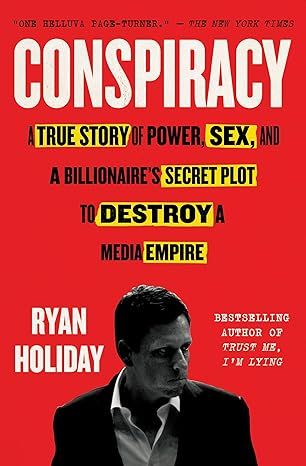Conspiracy: A True Story of Power, Sex, and a Billionaire's Secret Plot to Destroy a Media Empire
4.3 out of 5
1,965 global ratings
An NPR Book Concierge Best Book of 2018!
A Sunday Times of London Pick of the Paperbacks
A stunning story about how power works in the modern age--the book the New York Times called "one helluva page-turner" and The Sunday Times of London celebrated as "riveting...an astonishing modern media conspiracy that is a fantastic read." Pick up the book everyone is talking about.
In 2007, a short blogpost on Valleywag, the Silicon Valley-vertical of Gawker Media, outed PayPal founder and billionaire investor Peter Thiel as gay. Thiel's sexuality had been known to close friends and family, but he didn't consider himself a public figure, and believed the information was private.
This post would be the casus belli for a meticulously plotted conspiracy that would end nearly a decade later with a $140 million dollar judgment against Gawker, its bankruptcy and with Nick Denton, Gawker's CEO and founder, out of a job. Only later would the world learn that Gawker's demise was not incidental--it had been masterminded by Thiel.
For years, Thiel had searched endlessly for a solution to what he'd come to call the "Gawker Problem." When an unmarked envelope delivered an illegally recorded sex tape of Hogan with his best friend's wife, Gawker had seen the chance for millions of pageviews and to say the things that others were afraid to say. Thiel saw their publication of the tape as the opportunity he was looking for. He would come to pit Hogan against Gawker in a multi-year proxy war through the Florida legal system, while Gawker remained confidently convinced they would prevail as they had over so many other lawsuit--until it was too late.
The verdict would stun the world and so would Peter's ultimate unmasking as the man who had set it all in motion. Why had he done this? How had no one discovered it? What would this mean--for the First Amendment? For privacy? For culture?
In Holiday's masterful telling of this nearly unbelievable conspiracy, informed by interviews with all the key players, this case transcends the narrative of how one billionaire took down a media empire or the current state of the free press. It's a study in power, strategy, and one of the most wildly ambitious--and successful--secret plots in recent memory.
Some will cheer Gawker's destruction and others will lament it, but after reading these pages--and seeing the access the author was given--no one will deny that there is something ruthless and brilliant about Peter Thiel's shocking attempt to shake up the world.
336 pages,
Kindle
Audiobook
Hardcover
Paperback
First published June 24, 2019
ISBN 9780735217652
About the authors
Ryan Holiday
Ryan Holiday is one of the world's bestselling living philosophers. His books like The Obstacle Is the Way,Ego Is the Enemy,The Daily Stoic, and the #1 New York Times bestseller Stillness Is the Key appear in more than 40 languages and have sold more than 5 million copies. Together, they've spent over 300 weeks on the bestseller lists. He lives outside Austin with his wife and two boys...and a small herd of cows and donkeys and goats. His bookstore, The Painted Porch, sits on historic Main St in Bastrop, Texas.
Read more
Reviews
Kindle Customer
5
An absolutely transfixing tale told by a master
Reviewed in the United States on March 3, 2018
Verified Purchase
A number of years ago, my entire view of the world was flipped upside down after someone lent me "Trust Me I'm Lying", written by a young media savvy kid named Ryan Holiday. From that day onward, it became my number one recommendation in every conversation where someone goes off on a lament about something they saw or heard on the 'news'.
I began following everything I could by Holliday, reading his blog, learning about Stoicism... and time and time again, what he wrote transfixed me and transformed how I moved and acted in the world. On vacation in Israel, I slowly devoured "The Obstacle Is The Way" which has ever since made me look at 'problems' in my life in a new, healthy and powerful way.
When I received the email from Ryan the other week to his blog subscribers where he introduced his latest work, "Conspiracy" I clicked 'buy' on Amazon without even looking at the price.
The sheer scope of what the author has accomplished in both telling this outrageously intriguing tale, and in maintaining his relationships with those involved, is monumental. As the story progresses, strategy and tactics are mirrored in ancient and modern parallels, weaving timeless lessons together with contemporary story in a way that not only adds depth to tale, but broadens the narrative to encompass a wide swath of the human experience. Ryan's forte is to texture a tale without embellishment, to nuance without sentimentality, and to painstakingly reveal what casual observance overlooks.
I didn't know much about Hulk Hogan, or Peter Thiel before reading this book. I new nothing of Nick Denton or Gawker short of vaguely recalled sensational headlines I had skimmed over past years. Yet I found myself on two occasions pulling over in a park for 15 minutes between appointments to open up my Kindle just to enjoy another chapter. It's simply an astounding tale that grabbed my by the collar from the very first chapter.
If for some reason you have not yet discovered the utterly compelling and unique writing of Holiday, I kinda envy you. You have a great, life-enriching journey ahead that could begin right here.
I wish I could buy stock in Holiday, as I honestly think that if he continues his writing trajectory he could very well go down as one of the literary giants of our time, in some strange and as of yet opaque way that I can't quite put my finger on. His way of storytelling is unique, accessible, transfixing. His way of imparting timeless truths through story changes how you understand yourself and your place in this world.
Here's the highest recommendation I have ever voiced: Somewhere around half way through the book, during the middle of my workday, I had this thought... I don't know Ryan Holiday, and never met him. But if I could have a coffee with one writer alive today, it would be him. His work is just that good.
Read more
23 people found this helpful
Corey McComb
5
“What would the world look like if more people were to conspire
Reviewed in the United States on March 29, 2018
Verified Purchase
Ryan Holiday has managed to take an already insane story and turn it into a timeless lesson on strategy, ethics, and free speech. All tied together by the overarching question of, “What would the world look like if more people were to conspire?”
Reading Conspiracy was a bit like watching a season of Breaking Bad, in the sense that I become so emotionally invested in all the characters it was hard to know who to root for at different points in the story. The narrative alone is an amazing ride worth taking.
But besides the story itself, the book really made me rethink and clarify how I feel about free speech. “Discretion is the responsibility of freedom, the obligation that comes along with rights.” I had always felt this way, but am now armed with the words to articulate this idea to myself and others.
The lessons in Conspiracy go well beyond how to “plot revenge” or the question of “Should Thiel have done this?” The book is a guide and a plea for looking at situations from all angles. It's an homage to the power of planning and patience. It's about using all the tools and resources available and, at least, have the ability to think like a conspirator.
In a world where we mistake hasty commentary for real action, I believe this book proves how, more than ever, we need people to employ the lessons in this book. If only to manage themselves and their own actions.
Conspiracy turns a current event into a timeless classic filled with thought-provoking lessons and page-turning entertainment. Ryan wrote what everyone else missed and tied together larger themes no one else could have seen. 5 Stars all the way.
Read more
Cristina Chipurici
5
Essential read related to strategic thinking
Reviewed in the United States on April 10, 2018
Verified Purchase
The type of book that people will probably either completely love or hate - there's no middle ground. I personally fall into the first category. I've read all of Ryan's books, and find Conspiracy to be his best so far. Completely different from the rest and probably the hardest he's written.
The decade-long story of how Peter Thiel ultimately brought down Gawker is just the main narrative line, but the book is filled with tons of sub-stories. Expect a crash-course into media and conspiracies throughout the history.
Ethical questions, unimaginable amounts of power and money, patience, secret plotting, underestimating your enemy, not thinking about the consequences, gaps in the legal system, free speech - it has them all.
Ryan had direct access to all characters involved in the story, and what I enjoyed most is that I never felt that he's judgmental. He doesn't take sides. He researched this book while keeping a truly curious, open mind.
This is not a fight between good and evil - it's got all the tones of grey that are characteristic to real life's randomness. You really get to understand their reasons and where they come from.
I'd recommend it to anyone who wants to learn more about the new media system, conspiracy theories and strategic thinking in general (Peter Thiel's contrarian thinking and actions are fascinating).
Because of the nature of the subject, I expect this to be one of Ryan's most underrated books on the short term, and really grow as years pass.
Read more
Bradley Bevers
5
A Chess Match Between Two Titans And What It Means For You
Reviewed in the United States on March 3, 2018
Verified Purchase
One of my favorite authors, John McPhee, wrote a book about single tennis match called Levels of the Game. A book about a single tennis game does not sound like there can be much to it, but the story of the match is really the story of two men, how they were raised, what lead them to that space and time and playing style, and what that match meant as a pivoting point in race and culture. More than any other book, I was reminded of Levels of the Game while reading Conspiracy.
Most know the initial story - a private tape of Hulk Hogan released in the media - but the full story and its implications are well covered here. Holiday refers to Peter Thiel's love of chess more than once in the book, and this story also reminded me of a chess match. It's never a 'page-turner' in the traditional sense, but a very subtle battle between two opponents that swells over ten years. (I would highly recommend reading this rather than listening to it for that reason - there is enough depth to the story that it works best on the page, otherwise you will miss things).
I had read a little and already seen the Netflix documentary on the case, but here is what I really liked about the book:
- The story of the 'why did Peter Thiel do this' is much more complicated than can be explained by a documentary. Even after you remove all motives except for the personal, Holiday points out there were significant financial motives as well.
- Why choose the battlefield that they did? Thiel had almost limitless options to accomplish his ends, but chose a very specific means.
- I had not realized before reading this how much this case signals the clash between the right to privacy and the right to freedom that is still heading towards collision.
- Thiel is a fascinating guy, full of contradictions. One of my biggest takeaways is that I want to just learn more about him and read more about his Christian faith.
- There is not an easy answer to the question of who was right in this case, and Holiday does a good job of holding that tension for the entire book. Despite how despicable Gawker was in many cases and how easy it is to delight in their downfall, there is a real question of whether the ends justifies the means.
- The ultimate loser in this story, to me, is the legal system. It's very apparent that no one except for someone with very deep pockets could have made this happen. Depressing to realize that even a public figure like Hulk Hogan basically has no chance without being bankrolled by a billionaire in a case like this.
If you are interested in the story already, definitely pick this one up. There is a lot here that really adds to the public record and it is well worth your time to consider the larger questions it raises.
Read more
120 people found this helpful
JSJ
5
Detailed look into a conspiracy that opened my mind to new perspectives
Reviewed in the United States on February 25, 2023
Verified Purchase
After reading “Trust Me, I’m Lying,” I had to read “Conspiracy.” Reading both was an opportunity to go outside of my comfort zone and read about a topic I would have not normally gravitated to and one that I want to get into more.
“Conspiracy” was a fascinating and unsettling look at the balance of free speech vs the right to privacy. There needs to be balance between the two. The book also makes me think of the status quo. Do I accept the status quo when I see something unjust, unfair, or immoral or do I do something about it? Peter Thiel did something when Gawker outed him and when he extended that line of thought to all the other people Gawker had exposed and would expose in the future. He thought the conspiracy through the end when he would bring Gawker down. But he didn’t think about the unintended consequences. That was one of the most interesting chapters of the book after the description and the how of the conspiracy.
Read more
Triple E
4
A GREAT BOOK...the narration however was difficult for me
Reviewed in the United States on May 14, 2018
Verified Purchase
I rated this book and the narration with 4 stars because...well...
The pros: Excellent content! The information appears to be comprehensive and provided me with insight not found in the Netflix documentary or casually searching online. As in the other books Mr Holiday has written or helped write, he likes to accentuate important points or feelings with historical analogies and quotes. In my humble opinion the book itself is like 4.95 stars. The cons: Half of the narration sounded like he had a cold and it was horrible to listen to. Also, there were a couple of times when his historical analogies approach felt awkward or forced (but they did back up the point he was trying to make).
What I took away from this... Terry Bollea is the embodiment of being a man in this day and age. After going through this book if it were possible to reach out and empathize with him I believe my useless platitudes would be like throwing salt into the wounds of a man that has been torn apart. I believe it would be like trying to empathize with a recent rape victim. Peter Thiel, in this instance, was a genius up until he wasn't. I find his role in this story so amazing, enlightening and ultimately inspiring. Nick Denton and AJ were blinded by ambition and this lesson can never be repeated enough. Conspiracy is a great read and I look forward to Ryan Holiday's next book...without the stuffed up nose narration!
Read more
3 people found this helpful
Mike Conway
4
Entertaining, page turner, grand themes, cheapened in the end.
Reviewed in the United States on May 27, 2018
Verified Purchase
Learned about this book on Russ Roberts' EconTalk podcast, where he interviewed the author, Ryan Holiday. I am very happy that I decided to read the book. It was entertaining and a real page-turner as Russ Roberts indicated. Mr. Holiday brought in several over-arching themes, including conspiracy, secrecy, psychological motivations, and free-speech, from which I learned a lot and found new ways to think about these topics. In the end, however, I feel that the book was cheapened by over-the-top and one-sided criticism of President Trump. Surely, in a book where Peter Thiel is a main character, an author would be remiss in not mentioning Thiel's support of Trump and his speech at the Republican National Convention. It would also be fair to question whether Theil had regrets or second thoughts, as Trump has been anything but a libertarian. Yet, in a book where Nick Denton and A.J. Daulerio get balanced treatment, President Trump is called "incompetent" and a "big mistake." Perhaps he is, but these are things only one can be sure about with the benefit of time and passage into history. Holiday closes with a call to his readers to engage in conspiracy, and the proximity to his comments about Trump implies the deeper message, I still rated the book 4 stars. It was well written, it contained excellent references (added at least 4 books to my reading list), and I will continue to frequent Mr. Holiday's blog, because I think he has a lot of interesting things to say.
Read more
16 people found this helpful
Scotty Monroe
3
Narrative form distracting
Reviewed in the United States on August 8, 2024
Verified Purchase
Books like this should not be this difficult to read. This is a fairly straightforward business story about money, power and intrigue, with plenty of sex and gossip sprinkled in throughout. Granted, I've never written a book, but I've read plenty in this category—and this book is not well written.
Considering the meat and potatoes of this book is essentially about a lawsuit generated from a sex tape involving a quasi washed up 1980s wrestling phenom, there is a mind bogglingly amount of allusions to Hitler, Churchill and if memory serves me right even Clausewitz. What? I thought this was a tawdry piece of pop culture trash about the Hulkster and Peter Thiel? Why are we making allusions to the 20 July Plot from World War II? Who does this author think he is? This book reminds me of "The Scarlet Letter," where the narrator takes on such a role in the narrative that they become a character unto themselves.
I would recommend this book if this is a topic in which you're genuinely interested, as I'm unaware of other books regarding the lawsuit Peter Thiel funded against Gawker. However, in my opinion, be prepared to skim a lot of unnecessary fluff.
Read more
Turin
3
Too little butter spread over too much bread
Reviewed in the United States on May 13, 2018
Verified Purchase
3.5 Stars
The subject is fine; Holiday's interviews and access are fine. The <i> distilled</i> work product is fine.
Here is the thing- this is a 150 page book, not 330 pages.
Ha ha ha - "I didnt have time to make it shorter". Meanwhile I had to go through hash and rehash of repetition which was either because Ryan just padded out each chapter in his outline and never bother to see how the whole thing read through, or he had to sprinkle in a certain number of rhetorical questions to make it seem like there was more going on here than there was.
Did you want to read a book that was half rhetorical questions? Would you enjoy that? Would you rather an author supply lines of thought than you have to think of them yourself? Was it really the best of times? In what ways was it the worst of times? Sadly (wisely?) Amazon does not allow one to search just on "?" or we could get a true accounting. We may never know [meta:stay tune for updated review]. However we do know this: 223 sentences starting "How...", 226 "Could", 500 "Would".
"Or what if, after the verdict, Thiel’s libertarian impulses had been triggered and he’d used the lessons learned in Florida to stop Trump instead of supporting him? Would that change how you saw this? Would it change how I saw this?"
Ok- 200 pages of that.
On the other hand there is a strange generality of the topic for a book length treatment. I vaguely remember a Sarah Palin getting in a lawsuit with them over Gawker stealing and publishing part of her book. "Conspiracy" makes a big deal about copyright claims against Gawker as a legal strategy yet Palin is only mentioned in passing once. Gawker made a big deal about taunting her that this was protected the 1st Amendment [text of a Gawker post " Sarah: If you're reading this — and if you are, welcome! —you may want to take a moment to familiarize yourself with the law …"] but was beaten by her publisher's lawyers and was forced to take down the post and apologize. This is exactly the type of thing that Holiday waxed on and on about Theil and Mr. A trying to do, but Palin did it in 2010. Did Theil look in this case? Was it funded? Was it the Xerxes example that showed Gawker was vulnerable? We dont know because Holiday ignored this data point.
Here is the thing- Denton and AJ Daulerio are uninteresting drug addled nihilists. Reminiscent of James Carvilles remark- you drag a hundred dollar bill past an English composition department and you never know what you'll find. Denton found a disposable rotation of nearly unpaid college detritus who desperately churned out the click-baitest of headlines hoping to earn $25 per post and convince themselves that notoriety in their local Brooklyn bar was worth their complete lack of morals. That's not that basis of a book- at least not this book. Thiel is the only interesting character and Holiday meets out his interview quotes parsimoniously timed for whenever the reader is in danger of dozing off.
If you are reading this review- and others above it- then you probably already know everything you will get out of buying the book. In this case if you followed the news you already know 95% of the story. And the rest is left as a "?" for the reader.
Read more
12 people found this helpful
Fidel Cashflow
3
A fascinating story that is excruciatingly painful to read This is the story of how one ...
Reviewed in the United States on May 10, 2018
Verified Purchase
This is the story of how one of the world’s wealthiest and brilliant men, Peter Thiel, conspired to take down one of media’s most powerful men (at the time), Nick Denton, CEO of now defunct and infamous Gawker. The story itself is fascinating, and I appreciate that the author Ryan Holiday provided insight from all parties involved, however this book is absolutely painful to read at times, particularly the first third, and the ending chapters for different reasons. The story itself, could easily be told in half the length, but the book (I guess the author had to find ways to fill up 200+ pages) is filled, especially in the first hundred pages or so, almost entirely of conjecture into the minds of the people involved, repeating the same themes exhaustively over and over again (by the time you are done with the book, you will HATE the word “Conspiracy,” and everything pertaining to it because the word is used, described and explained ad nauseum), and for some odd reason, seemingly endless amount of quotes, from Dumas to Tolstoy- as if the author is trying to show off that, yes, he is well-read (I will get into that later).
Holiday’s bias, though not too overbearing (depending on how sensitive one is and on which side of the political spectrum one lies on), does manifest from time to time. It isn’t a big deal, because after all, this is his book with his narrative, not a piece of unbiased journalism, and to the author’s credit, he did a decent job keeping it relatively restrained. The few occurrences of bias rearing its ugly head, does detract from his work, however, because one is left wondering, what other parts of the narrative is tainted? For example, he paints Peter Thiel as bordering on maniacal, questioning how Thiel can write “a book that railed against multiculturalism and ‘militant homosexuals’ on campus, despite being both gay and foreign born.” From a libertarian standpoint, which Peter Thiel is, it makes total sense- for example, one can be African American, and unsupportive of Black Lives Matter if one sees it as a racist, bigoted, or violent movement. Likewise, a gay man can “rail” against “gay militarism,” if he thinks it is wrong. Holiday also suggests Thiel is a vengeful person, which may or may not be true, it doesn’t necessarily mean that he is, based solely on his decision to take on Gawker. Thiel could legitimately see himself as doing the right thing because the notorious “news” blog has ruined people’s lives, and perhaps the toxicity of its content is bad for society at large. Perhaps Thiel’s actions against Gawker are based not on desires of vengeance, but on a purely philosophical level- that personal privacy is a basic individual right that should not be exploited by yellow journalism behind the veil of the first amendment, lest individual freedoms be sacrificed for the sake of clicks.
From time to time throughout the book, Holiday points that out as well- that perhaps, Thiel acted in some combination of emotions, perhaps a little bit of vanity, a lot of resentment, and a smidgen of altruism. But Holiday makes no mistake to mention that it’s probably mostly out of paranoia, fear, and vengeance. Again, this is where the author’s bias can lead to misunderstanding of a libertarian mindset. This is most apparent when Holiday remarks how Thiel supported Trump at the Republican National Convention, and make a speech along a “list of fools he shared the stage with.” Well, at least Holiday did remark that as a Trump supporter, Thiel was “as at least, halfway sane.”
As stated earlier, however, what makes this book such a painful undertaking- almost chore-like, is that it is treated as if every thought, or action from the parties involved, as the story painstakingly unfolds, needed to be psychologically explained and reaffirmed with an obscure philosophical quote from some historical figure. For example, in one of his many psychoanalysis of Thiel’s decision to act against Denton and Gawker, Holiday explains loquaciously:
“In that it became important for Thiel to see Gawker as singularly bad, the conspirator takes up, often without consent, the mantle of defending (or freeing) a number of other people as his or her real reason for proceeding. It is a sort of self-serving selflessness, a shield against what is to come and the feeling it will provoke... I think of Sherman’s letter to the people of Atlanta, a city he believed must fall for his march to the sea to continue and for the North to win the Civil War. Though he’d once lived in the South… he now saw himself as an instrument of a power that must not be slowed down. To view Atlanta, this city that lay before him and his plans, as the sum total of its people would be to make the whole affair personal, not professional, and thus impossible. ‘You cannot qualify war in harsher terms than I will… War is cruelty, and you cannot refine it; and those who brought war into our country deserve all the curses and maledictions a people can pour out.’”
Alone, this isn’t so bad, but this book is filled to the brim with examples of such dramatic, and at times, over-the-top diatribe, with quotes from Cicero to Clausewitz. In fact, just to give you an idea, in ONE page, Holiday quotes Civil War General Sherman, The Count of Monte Cristo (I kid you not) and William James. This is not to say that all the quotes are mundane- some do serve a purpose, particularly Liddell Hart’s (the British Historian) strategies of war, and Machiavelli, whose themes in The Prince, are repeated throughout the book. But when quotes are used exhaustively, it becomes such a burden, that one is left wondering whether to continue on with the book, of skip paragraphs if not pages. You can argue, aside from some build-up of background information on the characters and what Gawker did to Peter Thiel, Part 1 (7 chapters) can largely be skipped.
As the story unfolds, after Part 1, the pace does thankfully pick up and it does become quite fascinating. It is almost as if this story is Machiavelli’s the Prince, or Sun Tzu's the Art of War manifested, depending on, of course, how accurately Holiday’s depiction of the characters are, or rather, how much of it you believe (this is where the author’s bias casts doubt). Assuming all Holiday’s psychoanalysis and conjectures are indeed accurate, readers can expect an intriguing story about how a genius billionaire took down a media mogul.
Finally, the last few chapters do drag, and this is where Holiday takes his narrative freedoms up a notch. He goes excessively into politics. What Thiel’s support of then candidate Trump has little if anything to do with the story, and serves no purpose other than for Holiday to inject some political commentary. He describes members of the movement #Gamergate as “alt-right,” and their style of attack as “loud, insistent, delusional”- a description that can be used to describe any opposing political movement depending on which side one is on, and links them incredulously to Thiel. The rest of the chapter, for some reason, is largely used as an attack on Trump. Ironic, for a person who wrote a book entitled, "Trust me, I’m Lying."
Read more
29 people found this helpful
Top Ryan Holiday titles
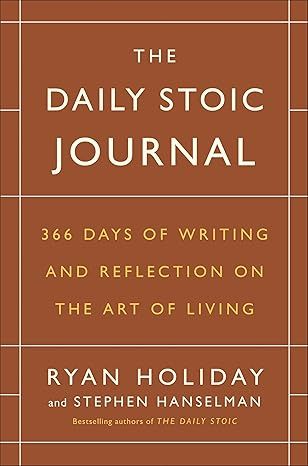
The Daily Stoic Journal: 366 Days of Writing and Reflection on the Art of Living
4.7
-
2,537
$15.99
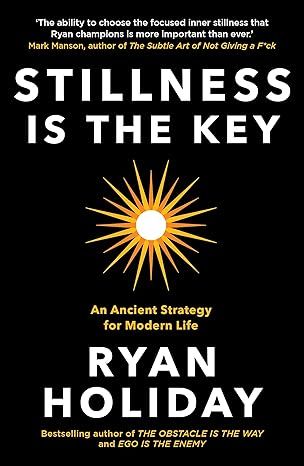
Stillness is the Key: An Ancient Strategy for Modern Life
4.7
-
9,966
$8.99
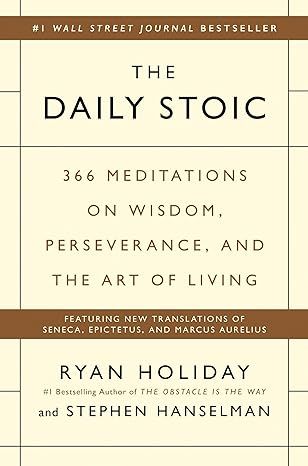
The Daily Stoic: 366 Meditations on Wisdom, Perseverance, and the Art of Living
4.8
-
32,641
$13.00
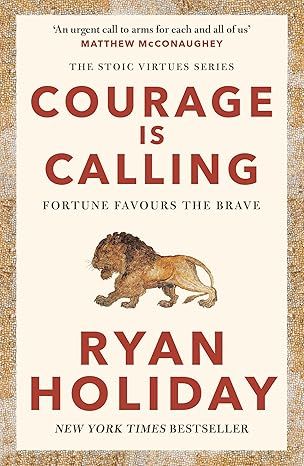
Courage Is Calling
4.6
-
4,763
$13.35
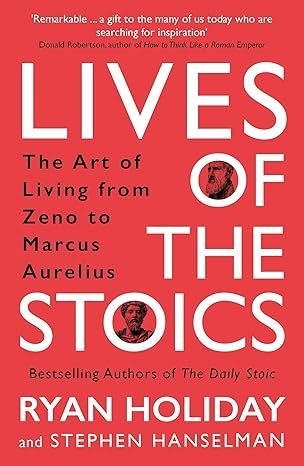
Lives of the Stoics: The Art of Living from Zeno to Marcus Aurelius
4.7
-
2,858
$8.99
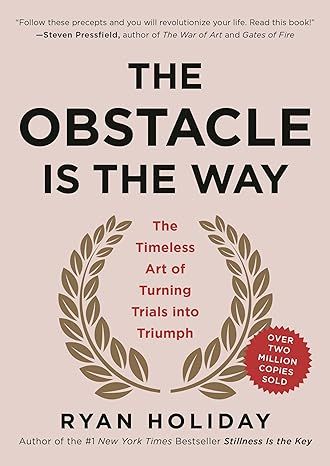
The Obstacle Is the Way: The Timeless Art of Turning Trials into Triumph
4.6
-
28,125
$4.99
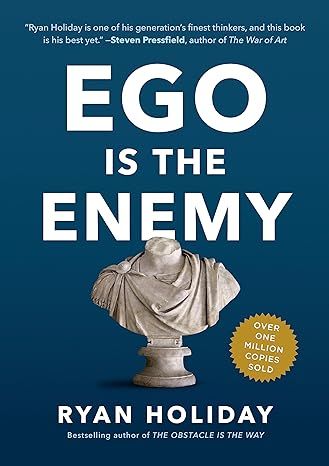
Ego is the Enemy: The Fight to Master Our Greatest Opponent
4.6
-
20,573
$11.99
Best Sellers

The Tuscan Child
4.2
-
100,022
$8.39

The Thursday Murder Club: A Novel (A Thursday Murder Club Mystery)
4.3
-
155,575
$6.33

Sapiens: A Brief History of Humankind
4.6
-
140,302
$13.49

The Butterfly Garden (The Collector, 1)
4.3
-
88,556
$9.59

Things We Hide from the Light (Knockemout Series, 2)
4.4
-
94,890
$11.66

The Last Thing He Told Me: A Novel
4.3
-
154,085
$2.99

The Perfect Marriage: A Completely Gripping Psychological Suspense
4.3
-
143,196
$9.47

The Coworker
4.1
-
80,003
$13.48

First Lie Wins: A Novel (Random House Large Print)
4.3
-
54,062
$14.99

Mile High (Windy City Series Book 1)
4.4
-
59,745
$16.19

Layla
4.2
-
107,613
$8.99

The Locked Door
4.4
-
94,673
$8.53
